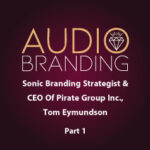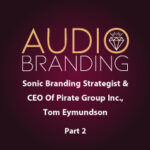“And what’s interesting is the agency usually comes back and says ‘this is amazing, how did you… this sounds, like, better than our music productions! This is, like, so authentic! This has grip! This seems like the Beatles in the garage!’ And I said ‘that’s what every agency guy wants.’ They want to find the Beatles in the garage, or Coldplay, or U2, or whatever, and be able to say ‘I was the first one who heard this.'” — Uli Reese
 This week’s guest left his hometown of Stuttgart to attend university in Los Angeles and begin his career as an orchestra conductor, composer, and orchestrator in Hollywood, working on shows like Paramount’s Star Trek: The Next Generation and Disney’s DuckTales. He’s an author, scholar, and co-owner of sonic-branding consultancy Amp, a five-time Cannes Lions speaker, and he’s considered one of the main thought-leaders in the audio branding industry. From a Lion to an Emmy, he’s won almost every industry award possible for his work, and over the last decade, Uli’s book series 101 Great Minds on Music, Brands and Behavior added a significant contribution to the education and understanding of sonic branding on both the agency and brand side.
This week’s guest left his hometown of Stuttgart to attend university in Los Angeles and begin his career as an orchestra conductor, composer, and orchestrator in Hollywood, working on shows like Paramount’s Star Trek: The Next Generation and Disney’s DuckTales. He’s an author, scholar, and co-owner of sonic-branding consultancy Amp, a five-time Cannes Lions speaker, and he’s considered one of the main thought-leaders in the audio branding industry. From a Lion to an Emmy, he’s won almost every industry award possible for his work, and over the last decade, Uli’s book series 101 Great Minds on Music, Brands and Behavior added a significant contribution to the education and understanding of sonic branding on both the agency and brand side.
Through over two hundred conversations with the most influential leaders in marketing, his mission is to change the conversation we’re having about sonic branding. His name is Uli Reese, and I have no doubt this conversation will be as fascinating as it is enlightening. So buckle up!
As always, if you have questions for my guest, you’re welcome to reach out through the links in the show notes. And if you have questions for me, visit www.audiobrandingpodcast.com where you’ll find a lot of ways to get in touch. Plus, subscribing to the newsletter will let you know when the new podcasts are available. And if you’d consider it, I’d love to hear what you think of the podcast! You can leave a review (that I’d love to feature on future podcasts!), either in written or in voice format from the podcast’s main page.
A Creator Economy
We start off the interview by talking about Uli’s thirteenth appearance at the prestigious Cannes Lions festival and his firsthand perspective on just how much it’s changed over the years. “Thirty years ago,” he recalls, “it was guys getting together saying I spent five million on this commercial or I got the Beatles and it was kind of an inside club. And now it’s like the creator economy.” We discuss the role that a stubborn piano teacher played in helping to shape his childhood love of sound and take a closer look at this century’s democratization of content creation all over the world. “If you have content that people want to see,” he says, “and you’re in the Amazon, you scale. You call the shots.”
Two Seconds to Understand

“I knew I wanted to write for film,” Uli tells us as we recount his early career, “so I did my school, finished that, and I knew I wanted to go to the U.S. because this was where things were made.” He talks about how music school in America turned out to be not at all what he’d hoped until a professor’s recommendation helped him find his true calling at the Dick Grove School of Music. He tells us about his work as a composer on Star Trek: The Next Generation, and the lessons it taught him about audio branding and creating an immediate audience reaction. “You need,” he says, “within two seconds to understand ‘oh, Star Trek: The Next Generation is on,’ or The Simpsons, or Star Wars.”
Owning the Body
Our talk about the future of audio branding continues as he compares Mastercard’s groundbreaking new Sonic Space to other pop-cultural brands we might not normally consider. “It’s like Billy Eilish writing a Bond song,” he explains, “Adele writing a Bond song, it’s based on the sonic DNA of Bond. And we do basically that but going into 35 different consumer touchpoints.” We talk about the branding perils of stock and license music, and the advantages of a more holistic approach to sound. “Most music that’s used by brands is not owned,” Uli says. “They might own the T-shirt, but they don’t own the body that’s wearing the T-shirt…. and when you don’t own your stuff, it’s difficult.”
The Entire Experience
“The reality,” Uli says as the first half of our interview comes to a close, “is that there has been no evolution in sonic branding in thirty years.” He notes the prominence of the Intel sonic logo even today as proof and points out the need for a more sophisticated strategy to keep up with the changing times. “In visual branding,” he notes, “you don’t just have a business card, you have an entire experience.” We talk about the prospect of brands becoming a platform for artists and how his work on Mastercard is helping to pave the way. “I want it to be an honor for an artist to write a Mastercard song.”
Episode Summary
- How the Cannes Lions festival has come to reflect a changing world
- Uli’s early memories of sound and childhood rebellion against musical authority
- How media franchises like Star Trek and James Bond pioneered sonic branding
- The advantages and limitations of license-free music versus in-house audio
- Evolving the field of sonic branding to catch up with 21st-century visual brands
Tune in next week as Uli and I talk about how Mercedes-Benz has been revolutionizing its approach to sonic branding, how the past ten years have changed the face of sound marketing and made audio branding more relevant than ever before, and just why Uli’s superpower is Aquaman.
Connect with the Guest:
Website: https://www.ampsoundbranding.com/
Best Audio Brands: https://www.ampsoundbranding.com/best-audio-brands
101 Great Minds: https://www.ampsoundbranding.com/101-great-minds-home
Mastercard Case Study: https://www.ampsoundbranding.com/ourwork/the-sound-of-mastercard
Other Amp Case Studies: https://www.ampsoundbranding.com/ourwork/
Follow Uli Reese on Facebook: https://www.facebook.com/uli.reese.5
Connect with Uli Reese on LinkedIn: https://www.linkedin.com/in/uli-reese/
Follow Uli Reese on Twitter: https://twitter.com/ulireese
Get your complimentary mini e-book and learn how to create your personalized and branded audio branding strategy with my Top Five Tips for Implementing an Intentional Audio Strategy.
Do you need a voice talent for your next project? Visit my voice-over website to find out more about how my voice can help you with your audio brand. You can also subscribe to the Audio Branding Podcast on YouTube to watch the show’s latest episodes.
Please leave the Audio Branding Podcast a written review or a spoken review so others can find the show on their favorite podcast player!
This interview episode was very skillfully made to sound beautiful by the talented Humberto Franco.

